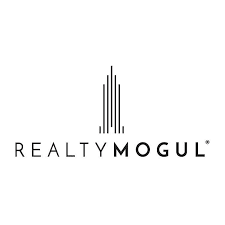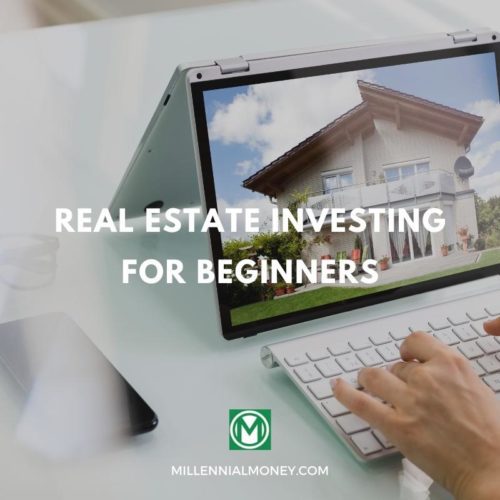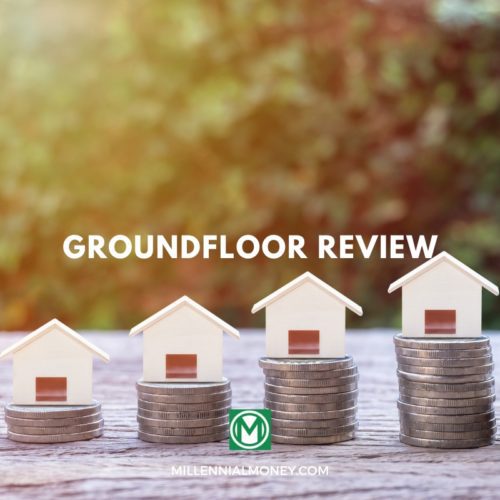There’s no doubt that real estate crowdfunding is shaking up modern investment portfolios.
Andrew Carnegie famously said that 90% of all millionaires created their wealth by owning real estate. But if you only have $5000 to invest, traditionally, you’re pretty much locked out of this amazing wealth-building strategy that can fast-track you to financial freedom.
Luckily, in today’s online real estate market, anyone can now invest through real estate crowdfunding platforms. By pooling together with other investors, you can invest in real estate for as little as $500.
Each platform has its own merits and niches – and its own downfalls. So, how do you choose a good site?
We did your homework for you by testing more than 50 different sites, and have narrowed down the list to only the best crowdfunding real estate sites.
11 Best Real Estate Crowdfunding Sites & Platforms
Here are the top picks for real estate crowdfunding platforms you can invest with today:
- Fundrise
- RealtyMogul
- Crowdstreet
- Roofstock
- Peerstreet
- EquityMultiple
- Alpha Investing
- AlphaFlow
- 1031 Crowdfunding
- Patch Lending
- DiversyFund
1. Fundrise
- Accredited Investors Only: No
- Minimum Investment: $10
Fundrise is a tech-focused real estate crowdfunding platform. They provide access to real estate investing through eREITs and eFunds, which are essentially diversified portfolios of private real estate assets throughout the United States.
Even better? Some of the listings on the site are available to Fundrise with a low minimum investment of just $10. This makes the platform perfect for those just getting into real estate investing and those with only small amounts of capital to invest.
Fundrise even has a quiz that will help you pick the right investments and plans for your financial needs and available capital. You should definitely check out this platform if you’re new to the real estate investing world.
Learn More:
I’ve been investing with Fundrise since 2017. Disclosure: when you sign up with my link, I earn a commission. All opinions are my own.
2. RealtyMogul
- Accredited Investors Only: No
- Minimum Investment: $1,000
RealtyMogul is one of the first companies to enter the real estate crowdfunding market. The platform offers a little bit of everything: from mobile homes to multi-family condo buildings and retail spaces. And to make matters even better, they have a minimum investment of just $1,000 on most offerings.
The crowdfunding platform is open to all individual investors, so anyone can take advantage of their awesome deals so long as you meet the income requirements of $200,000 per year or more.
Learn More:
3. Crowdstreet
- Accredited Investors Only: Yes
- Minimum Investment: $25,000
CrowdStreet focuses on giving investors direct access to institutional-quality commercial real estate (CRE) opportunities. The website mostly focuses on commercial projects like retail, office buildings, and multi-family condo buildings.
Even better, the platform gives you all the online tools you need for your real estate investments. Their well-designed platform makes it easy to view all active offerings, as well as projected returns and other related documents. When you’re ready to invest, just e-sign the required documents and send your investment.
CrowdStreet was historically an accredited investor-only platform, but that changed in August 2017 after the platform announced its first offering for non-accredited investors.
Today, the site has a mix of offerings with each having its own minimum investment. The lowest we’ve seen is an accessible $5,000 minimum investment, and the highest is a $50,000 minimum investment geared towards professional investors.
Learn More:
4. Roofstock
- Accredited Investors Only: No
- Minimum Investment: $5,000
Founded in 2014, Roofstock hangs its hat on being the first and #1 online marketplace for those interested in investing in single-family rental homes.
Though Roofstock is a relatively young company, they have overseen over $1 billion of completed transactions.
Roofstock realizes the real estate investing market can be very confusing, so they have sought to develop an entirely online platform that simplifies the process.
Through Roofstock, even first-time real-estate investors can feel comfortable. Roofstock proves to be an attractive option for real estate investors across the country.
Learn More:
5. PeerStreet
- Accredited Investors Only: Yes
- Minimum Investment: $1,000
PeerStreet focuses on residential debt, so you’ll be primarily investing in single-family projects like homes and storefronts. However, they also get the occasional condo building or other multi-family real estate crowdfunding projects.
The crowdsourcing platform partners with major lenders and provide the platform to get the funding. Gets high marks in the industry for transparency and excellent management.
PeerStreet is open to all investors and has a $1,000 minimum investment. Typically, you’ll find loans with 6-36 month durations and 6-9% returns, according to their team. This makes the platform perfect for those just getting into the real estate crowdfunding space.
6. EquityMultiple
- Accredited Investors Only: Yes
- Minimum Investment: $10,000
Founded in 2015, EquityMultiple focuses solely on professionally managed commercial real estate investments. This platform is one of the few that offers investment options of equity, preferred equity, and senior debt, allowing investors to select which best fits their investment goals.
With EquityMultiple, you can invest through several different accounts, including individual, joint, self-directed IRA, LLC, or trust. Additionally, you can choose three different investment strategies—Fund Investing, Direct Investing, and Savings Alternative Investing.
Overall, investing with EquityMultiple gives you plenty of flexibility and customization options as an investor. The company prides itself on excellent customer service and complete transparency in every deal. As of June 2022, EquityMultiple has returned over $240.3 million to investors. EquityMultiple is not the best choice for beginners, as it is only open to accredited investors with a minimum investment is $5,000.
7. Alpha Investing
- Accredited Investors Only: Yes
- Minimum Investment: $10,000
Alpha Investing takes a unique approach to real estate crowdfunding: they provide a concierge service, giving you direct access to a private manager and exclusive access to real estate crowdfunding awesome deals.
The concierge service is special because each investor has direct contact with a principal at the firm. These principals are available to speak directly about any issue, so you’ll never be left in the dark if you have questions or need clarification on an investment.
Do note that Alpha Investing is exclusive to accredited investors and requires a phone interview before you can invest. Not all will be approved either, so be sure you meet all requirements before signing up for an interview.
8. AlphaFlow
- Accredited Investors Only: Yes
- Minimum Investment: $10,000
Want to invest in multiple real estate offerings at once? If so, AlphaFlow is just what you need. On this real estate crowdfunding platform, just make one investment and AlphaFlow will invest your money for you into multiple offerings on its website.
Think of AlphaFlow as your personal investor for real estate investments. The platform will invest your money across a minimum of 75 real estate offerings around the web, so you’ll make maximum returns and substantially reduce risk.
The platform has a solid track record too. As of this summer, AlphaFlow has a portfolio of nearly 700 investments across 31 U.S. states. It has a net return of 8.40%, which is pretty great considering you’re investing in multiple properties at once.
9. 1031 Crowdfunding
- Accredited Investors Only: Yes
- Minimum Investment: $25,000
1031 Crowdfunding is a newer competitor in the real estate crowdfunding space. Nearly all of their offerings are commercial, with a focus on retail, hotels, and even self-storage. However, there is also an assortment of multi-family homes available for investment too.
The crowdfunding vets all investments on the platform, and its team has over 60 years of combined experience in the industry. So far, they’ve raised over $1.3 billion dollars and has over $2 billion in combined real estate transactions.
But what makes 1031 different than the rest of the portals? Simple: 1031 has a second product called 1031 Insurance. Use this platform to a way to guarantee that all of your exchange funds are invested in a replacement property rather than taxed for capital gains.
After all, why pay taxes when you can keep your hard-earned money working for you?
10. Patch Lending (formerly Patch of Land)
- Accredited Investors Only: Yes
- Minimum Investment: $5,000
Patch Lending (formerly known as Patch of Land) aims to be the real estate crowdfunding platform for everyone. They offer low minimums for accredited investors that are just getting started with real estate investing. Most investments have loan durations of just 12 to 24 months.
Browsing through Patch’s offerings list, you’ll see a focus on single-family homes in big cities and tourist-focused areas like Chicago, New York City, and even smaller cities in Hawaii.
All of the platform’s deals are thoroughly vetted by the company’s underwriters before being listed, so you can invest without worry. In fact, Patch Lending co-invests in all of its active offerings to provide that extra confidence boost.
11. DiversyFund
- Accredited Investors Only: No
- Minimum Investment: $500
DiversyFund is an investment platform that has broken the mold when it comes to fees. Why? Because they have none. Even the other top multimillion-dollar crowdfunding investment companies charge account fees. In addition, you can start investing in real estate with only $500.
The other thing I love about DiversyFund is its investment strategy. You see, they only invest in one type of property – multifamily housing. Why is that important? It’s one of the least risky types of commercial real estate.
DiversyFund takes it one step further. They look for properties that need some work. Don’t worry. We’re not talking about foreclosures. What I mean is they might need a new roof, updated bathrooms or kitchens, or a fresh coat of paint.
To meet their strict criteria, properties must be cash flow positive and in a high growth area. Their technology allows them to scan the country to find properties that fit. After a site visit, if the properties are approved, they do the upgrades,
Improved properties allow DiversyFund to increase rents for new tenants and for those with expiring leases. Increased rents increase property values. That means investors make more money when the properties are sold.
How Real Estate Crowdfunding Works
Crowdfunding (or equity crowdsourcing) is a non-traditional way for businesses to raise money. By reaching a large audience of smaller investors, businesses can raise large sums of money.
Not only does crowdfunding offer easier access to capital for the company (versus convincing a bank or single investor to give them the full amount), but it also lets everyday people invest small amounts of money while still becoming shareholders.
This has huge implications for the small-time investor. It allows them to invest in big-money projects like real estate, diversify the risk of their portfolios beyond equities, and open the potential of enormous returns if the company they choose is successful and/or eventually goes public.
How Real Estate Crowdfunding Began
In 2012, the Jumpstart Our Business Startups (JOBS) Act was signed into law. It allowed small and mid-sized businesses to crowdfund their capital needs.
Originally, because of the inherent risks of putting money into relatively unknown companies, the Securities and Exchange Commission (SEC) limited crowdfunding to only accredited investors. But in 2016, that restriction was removed and replaced instead with investment limits based on your annual income and net worth.
For the first time ever, non-accredited investors could back private companies or, in the case of real estate crowdfunding, purchase investment properties jointly with other investors.
How To Invest In Real Estate Crowdfunding
Crowdfunding makes real estate investing accessible to individuals with smaller savings.
With returns that can surpass 10% annually – along with the host of other wealth-building traits, I mentioned earlier – having real estate in your portfolio is a definite game changer.
Pooling your money together allows you and other investors to come together to purchase expensive properties you would have otherwise been unable to buy on your own.
There are different options when it comes to profiting from real estate crowdfunding.
Some deals involve receiving dividends from rental income (for example, by investing in apartment buildings that are already generating revenue), while others involve “flipping” the property – adding value by fixing or renovating it and then reselling the building for a profit.
Investment Limits for Crowdfunding
As I mentioned earlier, while the SEC opened real estate crowdfunding to non-accredited investors in 2016, they did still impose investment limits. These limits are based on your annual income and net worth:
Less than $107,000
If either your annual income or your net worth is less than $107,000, then each year you can invest the greater of (a) $2,200 or (b) 5% of whichever is less: your annual income or net worth.
For example:
| Income | Net Worth | Calculation | 12-month Limit |
|---|---|---|---|
| $35,000 | $100,000 | Whichever is greater: (a) $2,200 or (b) 5% of $35,000 ($1,750) | $2,200 |
| $140,000 | $70,000 | Whichever is greater: (a) $2,200 or (b) 5% of $70,000 ($3,500) | $3,500 |
More than $107,000
If both your annual income and your net worth are more than $107,000, then each year you can invest up to 10% of whichever is less: your annual income or your net worth. Your investment, however, cannot exceed $107,000.
For example:
| Income | Net Worth | Calculation | 12-month Limit |
|---|---|---|---|
| $155,000 | $110,000 | 10% of $110,000 ($11,000) | $11,000 |
| $220,000 | $800,000 | 10% of $220,000 ($22,000) | $22,000 |
| $1.3 million | $2.5 million | 10% of $1.3 million ($130,000), subject to cap | $107,000 |
Note on Crowdsourcing Limits for Married Couples
If you’re married, the SEC allows you to make the above calculations based on your combined annual income and net worth, even if your assets aren’t held jointly. However, your combined crowdfunding investments are still restricted to the above limits, as though it was a single investor at that annual income or net worth.
Can You Make Money in Real Estate Crowdfunding?
The short answer to this question is “yes.” In fact, in a 145-year study (“The Rate of Return on Everything, 1870-2015”), researchers analyzed the returns of the major investment types and found that real estate outperformed the stock market, and with less risk.
In recent years, according to Fundrise, the average annualized return for their crowdfunded investments was:
- 2021: 22.99%
- 2020: 7.31%
- 2019: 9.47%
- 2018: 9.11%
- 2017: 11.44%
- 2016: 8.76%
- 2015: 12.24%
- 2014: 12.25%
How Much Money Can You Make Crowdfunding Real Estate?
Like any investment, how much you can make by crowdfunding real estate depends on several factors. One of the biggest and most obvious is the amount of money you invest. The larger the investment, the larger the potential return.
From the returns above, you can see that crowdfunded real estate on average has performed quite well over the past few years. Depending on the amount of money you are able to initially or continually invest, the compounding interest and dividends you can make are unlimited.
Creating a starter portfolio of real estate is easier than ever with platforms that connect you and other investors with revenue-generating properties and projects.
Is Real Estate Crowdfunding a Good Investment?
While crowdfunding is new, real estate is not. And as we’ve pointed out, it’s a proven financial fact that real estate has a long history of profitability that has helped in part to build the wealth of the vast majority of this country’s millionaires.
If nothing else, investing in real estate adds an extra layer of protection to your portfolio against stock market declines. So, if you’re primarily invested in stocks and bonds, diversifying is a smart move.
And now, in addition to REITs (real estate investment trusts), crowdfunding allows everyday people to invest in real estate, where it used to only be available to the 1%.
That said, you should treat real estate crowdfunding the same way you treat other investments: do due diligence on the properties and funds you choose, in sectors you know about, and on platforms that are legit.
Which Real Estate Crowdfunding Site Allows Non-Accredited Investors?
Some real estate crowdfunding sites require that you be an accredited investor. This means you must either:
- Have earned $200,000 in annual income ($300,000 for joint investors) for the last two years with the expectation that you’ll earn the same or more this year, OR
- Have a net worth over $1,000,000, individually or jointly, excluding your primary residence.
The requirement exists because the SEC wants to ensure people investing in unregistered securities can afford to lose it. Additionally, the accredited investor requirement assumes that the person can do due diligence on their own.
For many investors, that bar might be too high. If you are not an accredited investor but still want to invest in real estate through a crowdfunded platform, you can.
Our list of top platforms gave priority to the sites that welcome all investors, but to recap:







Read 12 comments or add your own
Read Comments